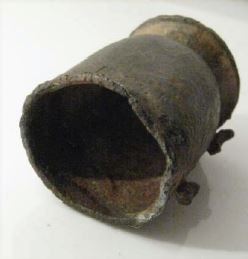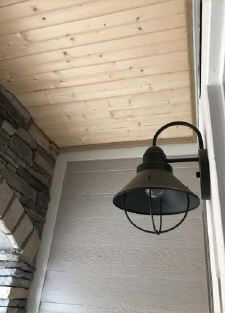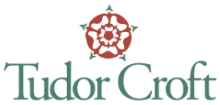The Rose Knows – January 2018
In the British Isles and Western Europe in the Middle Ages, well-to-do families had the luxury of slate floors that would get slippery when wet; therefore, they would spread “thresh” (straw) on the floors to help folks keep their footing. As winter progressed, the “thresh” would start slipping outside. A piece of wood was placed on the floor at the entrance way called a “thresh hold.” Here at Tudor Croft, thresh holds (made of wood or metal) are still placed as a buffer on the floor beneath the entrance doors. In our modern vernacular today, many words and saying have their roots in the life and times of by-gone years.
As The Old Saying Goes…
 Some of modern idioms are taken from the ordinary life of the people. For example, the phrase “rule of thumb” is a common benchmark or standard of judgment. Legend has it that Sir Francis Buller ruled that it was permissible to beat one’s wife with a stick, given the stick was no wider than the husband’s thumb. A less disturbing explanation of this adage is the length of the thumb was a good measurement for planting seeds in the ground or the measurement of a yard of cloth from the tip of one’s nose to the extended length of one’s arm, hand, and thumb. (Never mind the many variations of this method due to different arm lengths!). Another interesting saying was “Don’t throw the baby out with the water.” This goes back to the early Middle Ages. In those days, people generally bathed once a year. When they did, the entire family used the same tubful of water. Males bathed first, then females, children oldest to youngest, and babies last. Water became very thick and cloudy by the time of the baby baths, so mother had t be careful not to throw the baby out with the water. The meaning taken from this is to not throw away something valuable to one’s haste to discard something undesirable.
Some of modern idioms are taken from the ordinary life of the people. For example, the phrase “rule of thumb” is a common benchmark or standard of judgment. Legend has it that Sir Francis Buller ruled that it was permissible to beat one’s wife with a stick, given the stick was no wider than the husband’s thumb. A less disturbing explanation of this adage is the length of the thumb was a good measurement for planting seeds in the ground or the measurement of a yard of cloth from the tip of one’s nose to the extended length of one’s arm, hand, and thumb. (Never mind the many variations of this method due to different arm lengths!). Another interesting saying was “Don’t throw the baby out with the water.” This goes back to the early Middle Ages. In those days, people generally bathed once a year. When they did, the entire family used the same tubful of water. Males bathed first, then females, children oldest to youngest, and babies last. Water became very thick and cloudy by the time of the baby baths, so mother had t be careful not to throw the baby out with the water. The meaning taken from this is to not throw away something valuable to one’s haste to discard something undesirable. 
Food has often served as a metaphor for class structure and social etiquette. The idiom, “eating humble pie,” which means making an apology and suffering humiliation. It also refers to a person’s social economic class. During the Middle Ages, the Lord of the Manor would receive the finest cut of meat in his pie at a feast whereas the lowest standing persons’ because everyone would know the guests’ low status. Another “food” sign of wealth was pork. If a man could provide pork for his family, he was said to “bring home the bacon.” The homeowner would cut little pieces of the bacon to share with his guests, and all would sit around and “chew the fat.”
Some of our practical terms and saying have to do with death and dying. In Medieval Europe, lead cups or tankards were used to drink ale or whiskey. Sometime the lead content would knock out the drinker for a couple of days. These folks were laid out on the kitchen table, and the family would gather around and eat to see if the “dead” person would wake up, the custom of holding a “wake.” Another common phrase used today is “saved by the bell” meaning rescued in the nick of time. Being buried alive was once a common occurrence. Some people who feared this were connected to a bell above ground. At night guards listened for the ringing of the bell in case they had to dig up a living person and “save them by the bell.”
Hard At Work

Here at Tudor Croft, Sure Point Builders, artisans, and staff are alive and well. They have all woken up on the right side of the bed (the left side was once considered sinister) and are busy at work. They are working on many homes in Phase I and Phase II, including two spec homes at 5 Leeds Lane and 20 Tudor Way. 
Some ancient sayings and rituals are worth remembering and keeping. For centuries bread and salt have been the center of welcoming ceremonies in Slavic (Russian and Eastern European) countries. Bread is associated with hospitality and is given to welcome the family to the community. Salt is given to symbolize the flavor needed in one’s life and the propagation of long friendships among neighbors. May the meanings of bread and salt bring good fortune to our Tudor Croft family for many years to come.
Welcome to Our Court!

